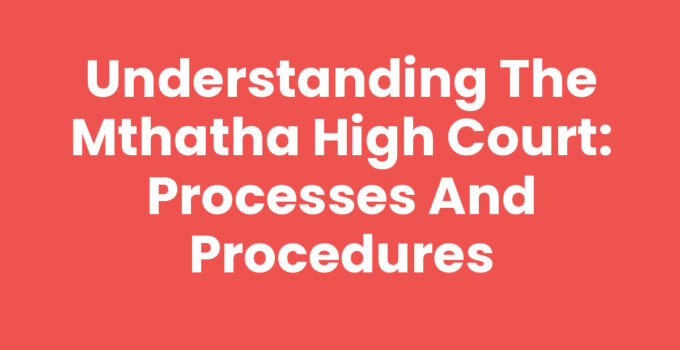The Mthatha High Court is a pivotal institution in the Eastern Cape of South Africa, offering crucial legal frameworks and serving as a higher court for appeals and serious legal matters. In this blog post, we will explore the functionality, procedures, and the importance of this court in the legal landscape of South Africa.
What You Need to Know About the Mthatha High Court: A Comprehensive Guide
The Mthatha High Court, officially known as the Eastern Cape Division of the High Court, plays a significant role in the administration of justice in the Eastern Cape region. It handles serious criminal cases, civil matters, and appeals from lower courts. Here’s a step-by-step guide to understanding its operations:
- Jurisdiction and Authority: The Mthatha High Court has jurisdiction over various types of cases, including civil cases with claims exceeding a specific threshold, serious criminal offenses, and constitutional matters. Understanding its jurisdiction helps in recognizing which cases can be presented here.
- Filing a Case: To file a case in the Mthatha High Court, applicants must submit the necessary court documents, including summons and particulars of claim, to the court’s registry. It is crucial to ensure that all paperwork is meticulously filled out to avoid delays.
- Days of Court: The court typically sets specific days for particular types of cases. For example, civil matters may be scheduled on certain weekdays, while criminal matters might be on others. Knowing the court calendar is important for case scheduling.
- Preparation for Court: Before your court date, you should prepare thoroughly, which includes gathering evidence, contacting witnesses, and possibly consulting with a legal representative. This preparation can significantly influence the outcome of your case.
- The Court Hearing: During the hearing, both parties will present their sides. It is essential to understand court decorum, including how to address the judge and present your arguments clearly.
- Judgment: After considering all evidence and arguments, the judge will deliver the judgment. It is vital to understand the difference between a judgement and a verdict, as the latter is often associated with juries.
- Appeals Process: If you’re dissatisfied with the outcome, you may have the option to appeal to the Supreme Court, under certain conditions. Knowing the appeals process and timeframes is crucial for individuals seeking to challenge decisions.
Check This: Explore King Sabata Dalindyebo Tvet College Mthatha Campus
The Importance of the Mthatha High Court in Local Justice
The Mthatha High Court is not only essential for handling cases but also crucial in the broader context of upholding the rule of law in the Eastern Cape. It serves as a means of redress and ensuring that justice is accessible to all its citizens.
Some important points to consider include:
- Legal Precedents: The Mthatha High Court’s rulings contribute to the body of case law in South Africa, providing guidance for future cases and interpreting laws.
- Access to Justice: The court offers mechanisms for legal aid and support to ensure that those who cannot afford legal representation can still seek justice.
- Community Engagement: There are initiatives aimed at educating the public about their rights and the judicial process, promoting greater legal awareness among citizens.
Read Also: Ksd Tvet College Online Application, Mthatha – A Complete Guide
Common Challenges Faced in the Mthatha High Court
While the Mthatha High Court serves an essential role, there are common challenges faced by individuals interacting with the system:
- Delays in Proceedings: Long waiting periods for hearings and judgments can cause frustration. Understanding how the court schedules cases can help manage expectations.
- Legal Complexities: The legal process can often be complex and confusing. Many individuals benefit from consulting a lawyer familiar with the court’s operations.
- Language Barriers: With diverse languages spoken in the Eastern Cape, ensuring effective communication within the court can sometimes be challenging, necessitating interpreters in some cases.
Overall, while there are hurdles, the Mthatha High Court remains an vital component of the justice system, ensuring that justice is served efficiently and fairly.
Recommended Guide: Discover the Top Luxury Hotels In Mthatha for Your Stay
Conclusion
In summary, the Mthatha High Court stands as a cornerstone of the legal framework in the Eastern Cape, handling various cases and ensuring that justice is accessible to all. Understanding its processes and operations is crucial for anyone looking to navigate the judicial system effectively. We hope this guide has provided valuable insights into one of South Africa’s significant legal institutions.
Frequently Asked Questions
What types of cases does the Mthatha High Court handle?
The Court handles serious criminal cases, civil matters, and appeals from lower courts.
How can I file a case in the Mthatha High Court?
You can file by submitting the necessary documents to the court's registry.
What is the appeals process like in the Mthatha High Court?
If dissatisfied with a judgment, you may appeal to the Supreme Court under specific conditions.









